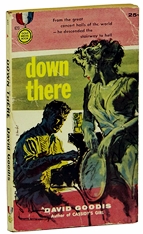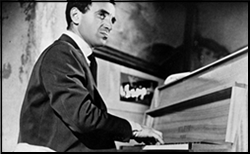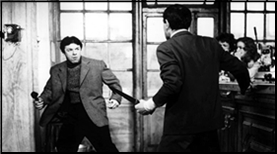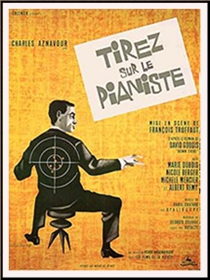Sat 27 Mar 2021
A Book! Movie!! Review by Dan Stumpf: DAVID GOODIS – Down There // Film: SHOOT THE PIANO PLAYER (1960).
Posted by Steve under Crime Films , Reviews[11] Comments

â— DAVID GOODIS – Down There. Gold Medal #623, paperback original, January 1956. Black Lizard, paperback, 1987. Included in Crime Novels: American Noir of the 1950s, hardcover, Library of America, 1997.
◠SHOOT THE PIANO PLAYER. France, 1960, released as Tirez sur le pianiste. Astor Pictures Corporation, US, 1962. Charles Aznavour, Marie Dubois, Nicole Berger, Michèle Mercier. Based on the novel Down There by David Goodis. Director: François Truffaut.
In substance, Down There is pretty typical Gold Medal stuff, what with fistfights, chases, mobsters, broads, and other rugged manly stuff — the story is something about a threadbare piano player (Eddie in the book, Charlie in the film) at a seedy bar getting involved with gangs and a waitress — but flavored here with the boozy poetry unique to David Goodis. Goodis could hear the circular logic of a drunk and find in it the awesome redundancy of a Beethoven composition. His characters keep trying to grapple with the meaning of it all, keep losing, keep grappling again….

Oftentimes they succeed in resolving whatever the plot is – they catch the killer, foil the criminal, rescue the damsel — only to lose some more Important objective, stuck in whatever personal swamp they started out the book in. So the final lesson of Down There is not just that You Can Go Home Again… your destiny was to never really leave,
Shoot the Piano Player takes the fatalism of the novel and infuses it with director Francois Truffaut’s soft heart and Gallic wit. The circular story is still there, faithfully filmed from the novel down to small detail, but it seems somehow more human, as if it isn’t fate so much as the characters themselves that leads them to their predestined ends.

Along the way there are plenty of pauses for the bit players to get out and stretch their legs a bit — stock characters in Goodis novels and Truffaut films simply refuse to behave like stock characters — so when Charlie (Charles Aznavour) and Lena (Marie Dubois) are kidnapped by gangsters early on, their captors end up swapping jokes with them. And later on, a thuggish bartender muses aloud about his bad luck with women as he’s trying to choke Charlie to death.
The point, if there is one (it’s never quite safe to go looking for a moral lesson in Truffaut films or Goodis novels), may be that no one is really ordinary: not In pulp novels, B-movies or what we call Real Life; skid-row bums might be heroes, goons can feel tenderness, and a spearcarrier in the back row of Aida may actually be singing an aria, if we listen closely.

March 27th, 2021 at 7:16 pm
Goodis is in many ways the poet of despair. His world in unforgiving and yet bleak as it is there are glimpses of wild flowers in the cracks in the sidewalk.
Where in Woolrich fate looms large, cruel, and inescapable in Goodis it is also incomprehensible and casual. Goodis characters don’t really have destinies, they are more refuse tossed by the wind against any will they might have, at best they have empty victories that often change little.
Surprisingly Truffaut’s humanist approach to life and storytelling work very well in balance with both Woolrich and Goodis (Charles Williams too). He doesn’t so much soften the darkness of their worlds as bring it into sharper contrast.
March 27th, 2021 at 9:55 pm
Seeing the film for the first time, is an eye-opening experience, especially if one is not familiar with Truffaut.
The bio of David Goodis is a rather sad one.
March 27th, 2021 at 9:57 pm
Charles Aznavour, on the other hand, went on to become a beloved figure in French culture. The ‘Frank Sinatra’ of France. Handsome, talented, and debonair for the rest of his days. We should all be so lucky.
March 27th, 2021 at 10:42 pm
He was my wife’s favorite singer.
But he was a pretty good actor too, as I’m sure that anyone who’s seen this movie would tell you.
March 28th, 2021 at 7:44 pm
I used to always mistake him for Jean-Louis Trintignant, initially
March 28th, 2021 at 7:48 pm
Steve, you published this review previously in October 2018. My comment was, having seen the film, which is one of my favourites, I would try and buy the book. I did buy the book two years ago. Now I must make an effort to read it. I have a UK reprint published as “Shoot the piano player†by Prion books in 1999.
Your comment was, you thought you had a copy of the DVD of the movie, and you were going to watch it!
March 28th, 2021 at 9:52 pm
Oops. Reruns exist for a purpose, but I didn’t mean to spend all the time I did getting this review formatted all over again. My fault, but this one’s one of Dan’s better efforts, so there’s that.
No, I never did find my DVD of the movie, but I did find a video clip of some of the better moments that I watched a while back. I wonder if I could do better now. I forgot to check that out too.
March 28th, 2021 at 9:57 pm
No, I haven’t found the whole movie on YouTube, but here’s the short documentary on it that I found earlier:
And ha! It’s playing now on HBO Max and The Criterion Channel.
March 28th, 2021 at 10:22 pm
Yes, I should have noted that this is a great review. So much covered in a short space. We have a three day COVID lock down from this evening. What better time to read it.
April 24th, 2021 at 1:07 pm
Hi! Me again. How are You? If those who want to watch it online, it is available at ok.ru with Sub at:
https://ok.ru/video/29762849294
And at another video streaming service a Dailymotion at: https://www.dailymotion.com/video/x50pf7q
Hope it helps and enjoy and take care and God Bless.
April 24th, 2021 at 1:18 pm
Thanks for the links, Serge. Both videos are in French, though, which I can read but no more than that. But the movie is still a lot of fun just to watch!